Lack of sleep can make life unbearable. There are many
physical and mental health problems associated with insomnia.
Lack of sleep can easily make people cranky and less able
to function. There is also evidence that suggests other
dangers associated with insomnia; these could pose long-term
consequences for people’s health and ability to enjoy
life.
Insomnia is difficulty getting to sleep or staying asleep
for long enough to feel refreshed the next morning, even
though you've had enough opportunity to sleep.Most people
have problems sleeping at some point in their life. It's
thought that a third of people in the UK have bouts of
insomnia. Insomnia tends to be more common in women and
more likely to occur with age.
Would you like to sleep like
a baby without taking drugs? Americans spend upwards
of 3 billion dollars a year on sleep medications, |
It's difficult to define what normal sleep
is as everyone is different. Your age, lifestyle, environment
and diet all play a part in influencing the amount of
sleep you need.
It's thought that up to
a third of people in the UK have symptoms of insomnia
at some point in the year,
The most common symptoms
of insomnia are:
The symptoms of insomnia depend on the type of sleeping
problem that you have. A lack of sleep can affect your
mood and cause tiredness and fatigue during the day.
•lying awake for a long time at night before falling
asleep
• waking up several times in the middle of the night
• waking up early in the morning and not being able to get back to sleep
• feeling tired and not refreshed by sleep
• not being able to function properly during the day and finding it difficult
to concentrate
• being irritable
When you eat late, you wake
up tired. Your body will be busy digesting your
dinner while you are trying to sleep, so you
won't feel rested in the morning. Do not eat
anything for at least three hours before bedtime.
Also, cut back on eating bacon, cheese, chocolate,
ham, potatoes, tomatoes, and sausage, especially
before bed. These foods contain tyramine, which
inhibits neurochemicals like norepinephrine and
can cause insomnia. And, of course if you have
sleep problems, caffeine should be cut out. Source |
How much
sleep do I need?
As every individual is different, it's
difficult to define what ‘normal sleep’ is.
Factors that influence the amount of sleep you need include
your age, lifestyle, diet and environment.
For example, newborn babies can sleep for 16 hours a day, while school-age
children need to have an average of 10 hours sleep. Most healthy adults
sleep for an average of seven to nine hours a night. As you get older,
it's normal to find sleep more difficult to maintain, although you still
need the same amount of sleep.
Medical
Acupuncture
A Journal For Physicians By Physicians
In a study of outpatients in his department,
Fischer9 reported similarly encouraging results:
100% of patients treated for insomnia obtained
benefit without recurrences within 18 months of
follow-up. Montakab and Langel10 diagnosed 40 patients
using Chinese traditional diagnosis and performed
polysomnographic analyses of true acupuncture vs
control needled patients. Objective change was
noted and found statistically significant in the
true acupuncture group. Source |
About 10-15 percent of Americans suffer
from chronic insomnia, and while this type of condition
is not deadly in and of itself, it can lead to a whole
host of other disturbing mental and physical effects.
The ill effects of insomnia can be immediate
after just one sleepless night. (Even not getting enough
sleep per night can be dangerous: studies show that mortality
rates spike in those that sleep drastically less than
seven hours a night.) According to recent research by
Matthew Walker, director of the Sleep and Neuroimaging
Laboratory at the University of California, Berkeley,
the amygdala—the part of the brain that alerts
the body to be prepared in times of danger—goes
haywire when a full night's sleeplessness occurs. That
in turn wreaks havoc on the prefrontal cortex, which
controls our logical reasoning and "fight or flight" reflex,
turning us, as Walker says, into "emotional Jell-O." Memory
capacity and speech control diminish; irritability spikes.
Struggling
to sleep? You'll pack on the kilos: study
At the same time, some studies have shown
that cortisol, a hormone related to stress and depression
and linked to cardiovascular disease, is building up
in the body instead of being moderated by a good night's
rest. Concentration is kaput. The muscles ache. What's
worse, the external, ordinary dangers of modern life
become many times more deadly: according to the U.S.
Department of Transportation, there are about 200,000
car accidents a year caused by sleepy drivers, killing
more people than drunk driving. Essentially robbed of
its power to encode or consolidate memories after just
one day, the brain quickly instead begins to mimic the
profile of people with acute psychiatric disorders.
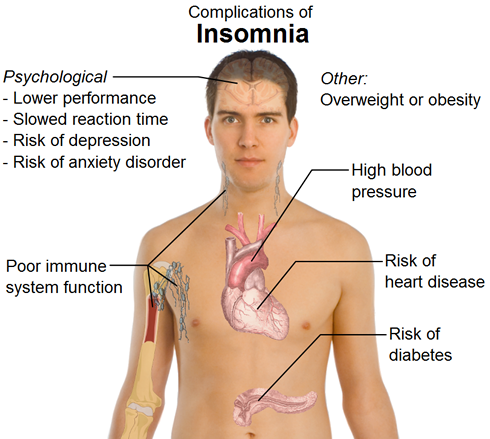
There have been a number of other risks associated
with acute or chronic insomnia. It can have an impact
on both physical and mental health.
1.Lack of sleep may lead to the development of type
two diabetes. A study by the University of Buffalo in
2009 found that participants who slept for less than
six hours a night were up to five times more likely to
have impaired fasting glucose levels; this is often viewed
as a precursor to developing type two diabetes.
2.Those who suffer with chronic insomnia are believed to be more prone
to illness and accidents.
3.Long term insomnia means that individuals are more susceptible to reacting
badly to stressors. This increases the risk of developing mental illness;
many of those with chronic insomnia have been known to turn to substance
abuse for help. Reliance on night sedation can become a big problem with
its own risks.
4.Lack of sleep can lead to decreased performance and problems with memory.
This can affect every aspect of a person’s life and could even
make them more at risk of car accidents or for making errors when operating
dangerous machinery.
5.Tiredness makes it harder for individuals to find enjoyment in life.
If people are tired all the time, they don’t want to do anything.
Maintaining a social life can be difficult due to a lack of energy.
The dangers of insomnia mean that it is important for
those with insomnia to find ways to deal with the problem.
If it continues for a long period it may be necessary
to seek medical advice
Studies show that insomnia
drugs can cause drug induced stupors that people
who are take these medications often find it
difficult to concentrate on what they do.These
drugs can raise complex sleep related behaviors.
Many cases of driving while sleeping are directly
related to insomnia drugs. These drugs also cause
hallucinations and nightmares which can be violent
at times that the person taking these drugs sometimes
gets violent jolts and wake up screaming and
sweating.
Other rare but potential side
effects of insomnia drugs is a severe allergic
reaction and severe facial or airway swelling
which can occur even after the first dose.
Severe allergic reactions can even be fatal
at times.
NB FDA requested
in early 2007 that all manufacturers of sedative-hypnotic
drug products strengthen their product labeling
to include warnings about complex sleep-related
behaviors and anaphylaxis and angioedema. |
As insomnia is not an illness or a disease,
simply a symptom of other underlying cause. So its important
to understand the root cause and find a cure for it.
There are several alternative non-drug measures and natural
solutions to insomnia and other sleep disorders. These
promote better sleeping habits and help in making sleep
better. Its very important to avoid chronic dependence
on insomnia drugs
Insomnia and Steroids Mental
preparation is key to handling the insomnia.
If your doctor has prescribed steroids, begin
mentally preparing yourself for the ordeal to
come. It is important to remain as calm and tranquil
as possible, so try not to fill yourself with
dread at the impending loss of sleep and other
uncomfortable side effects |
Acupuncture
for Sleep Disorders,and Insomnia.
Acupuncture, a form of alternative medicine, is becoming
an increasingly popular method to treat many medical
conditions, including sleep disorders.
Sleeping
pills vs Acupuncture
Sleeping
pills |
Acupuncture |
| Have a sedative effect - cause day
time drowsiness that may affect driving |
Improves concentration, enhances memory,
eliminates stress. Causes no undesirable sedation. |
| Addictive |
Non addictive |
| Do not treat the underlying cause |
Treats underlying cause, benefits
your health in many other ways |
| The response is quick and benefit
is only short term; stops working once you stop taking
the pills |
The response is somewhat slower than
the sleeping pills, but the positive effects last |
| Good for short term relief; should
not be taken for longer than two weeks |
Good for both short and long term
relief |
| Use of sleeping pills associated with
significant increased risk
of death |
Source |
Most of us Know Acupuncture dates back thousands of
years and is rooted in Eastern healing practices. But
did you know It's based on a concept that all disease,
including sleep problems , is the result of an imbalance
of subtle energy moving throughout the body. This energy
moves along 12 pathways in the body called meridians.
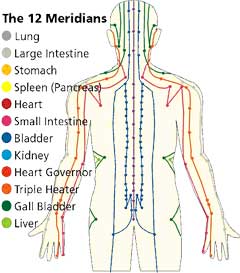
Through the ages, practitioners have identified and
charted these meridians. Treatment by acupunctur used
to involves inserting very fine needles at various points
along these meridians to increase, decrease, or balance
the energy flow, now there are very simple to use Electronic
acupuncture systems ,with a proven track record...
Does the medical field
approve of acupuncture?
There are more than 16,000 licensed acupuncturists in the United States
and 3,000 physicians who perform acupuncture as part of their medical
practice. The World Health Organization currently recognizes more than
40 medical problems -- including pain, sleep,gastrointestinal, gynecological,
and respiratory conditions as well as sports injuries -- can be helped
by acupuncture treatment. Lastly, in 1996 the U.S. Food and Drug administration
(FDA) reclassified acupuncture needles, regulating them as it does other
medical devices.
Sometimes internal imbalances of the internal organs,
known as the zhang-fu, can lead to sleep disorders.
Zang and fu consist of the five zang and six
fu organs. The five zang organs are the heart (including
the pericardium), lung, spleen, liver, and kidney.
The six fu organs are the gall bladder, stomach,
large intestine, small intestine, urinary bladder
and the sanjiao (three areas of the body cavity).
Zang and fu are classified by the different features
of their functions. The five zang organs mainly
manufacture and store essence: qi, blood, and body
fluid. The six fu organs mainly receive and digest
food, absorb nutrient substances, transmit and
excrete wastes. As the Suwen says: The five zang
organs store up essential qi and regulate its outflow.
The six fu organs transform and transport substances
without storing them and for this reason they may
be over-filled but cannot be filled to capacity. |
One result is a mind which never shuts
down and is still active when the patient lies down in
bed. Another disorder results in a quiet mind, but the
patient remains awake and unable to fall asleep. Disorders
of the zhang fu or the channels can lead to awakening
after falling asleep, sometimes at the same time every
night.
According to research, about
80 percent of women diagnosed with breast cancer
and undergoing
chemotherapy will have non-optimal sleep, and
nearly 60 percent of cancer patients will experience
chronic
sleep problems even after their treatment is
complete. “It
might not be insomnia, but it won’t be perfect
sleep,” said Oxana Palesh, PhD, MPH, acting
assistant professor of psychiatry and behavioral
sciences and a co- investigator on the study. |
From a TCM (Traditional Chinese Medicine)
point of view,The vast majority of sleep problems are
emotionally based. In TCM each of the internal organ
systems is correlated with an emotion: The lung organ
system is associated with grief and sadness, the liver
with anger and frustration, the kidney with fear, the
spleen with worry and the heart with joy. An excess of
any of these emotions can adversely effect the organ
system and conversely, if the organ system is affected,
the associated emotional state may be elicited. Since
all the organ systems are connected internally by a series
of pathways (called meridians), any disturbance in one
system will, over time, effect the others.
For centuries, the Chinese have been using
acupuncture to help people sleep better. Acupuncture
can have a powerfully relaxing effect. When stress has
been identified as the root of the problem then acupuncture
for sleep can be part of the solution.
Emotional Problems:Acupuncture
can calm the mind and promote sleep
Another cause for insomnia can be emotional problems
such as anxiety and depression. Often you can hear hear
acupuncturists use the expression ‘calm the mind’.
The calming state of relaxation and well-being induced
by acupuncture in general and by some specific points
is favourable to stilling thoughts.
So Acupuncture may be an excellent treatment option
for many types of sleeplessness.
Many people
looking at acupuncture charts,,go into withdrawal
:) so many points, where to put the units?
Here are some of the most commonly used
traditional points for sleeplessness set out for you
in easy diagrams
Sleep
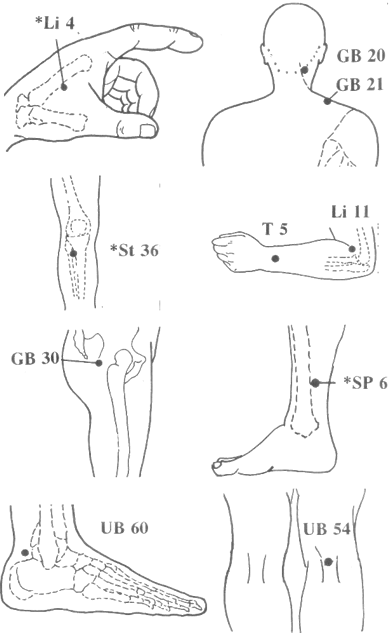
Insomnia
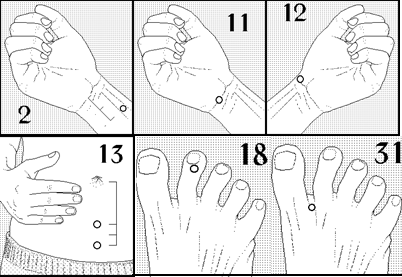
Enhance
your Energy or your Qi
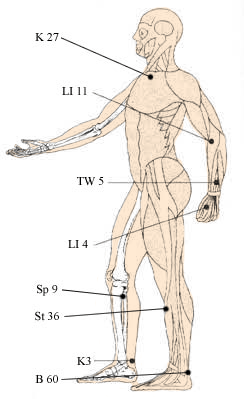
Other Sleep Points
1. The Hand: With your palm facing up, find
the juncture where the wrist meets the hand with
the thumb of your other hand;
2.apply to the spot between your eyebrows, at the juncture of the
bridge of your nose and your forehead.
3.the points at the indentation at the base of the skull on the
back of the head; move outward an inch on both sides of the skull
at the hairline
SOME
ACUPUNCTURE POINTS
WHICH TREAT HEADACHE
San
Jiao 17
Chinese Name: Yifeng
(excellent point for Liver
heat in patients who always complaint
with insomnia or headache) |
|
Neiguan(PC6)
Location: On the palmar side
of the forearm and on the line connecting
Quze(PC3) and Daling(PC7), 2 cun above
the crease of the wrist.
|
|
Zhaohai
(KI6)
Location : On the medial border of the foot, in the depression
below the tip of the medial malleolus.
|
|
| Shen Men (HT 7) |
|
Repeat, treatments have a cumulative
effect. Sometimes lasting results are immediate,
but most often it takes a while. Each time
you activate the Healing Response it brings
the system closer to normal. If you do not
get a response quickly you can increase the
frequency of treatment. Some acupuncturists
report treating people 160 times from a few
minutes up to 20 minutes.
As you repeatedly stimulate the points over
time the nervous system learns a new response
to the problem. Sometimes it is like teaching
puppies a new trick. At first you must coach
them frequently and then one day they know the
new trick. Sometimes this is learned for life,
but most often you will just need to remind them
of the trick you want them to remember. As you
know each puppy is different and the more difficult
the trick the more you must work to get the learned
response. Long-term results with acupuncture
depend on repeated use. If you have difficulties
getting results, be patient and keep trying. |
Quality sleep makes a huge impact in your well-being
and quality of life. Acupuncture can help you find better
sleep, find relief from insomnia, and have lots of energy
to get through the day.
Sources |

